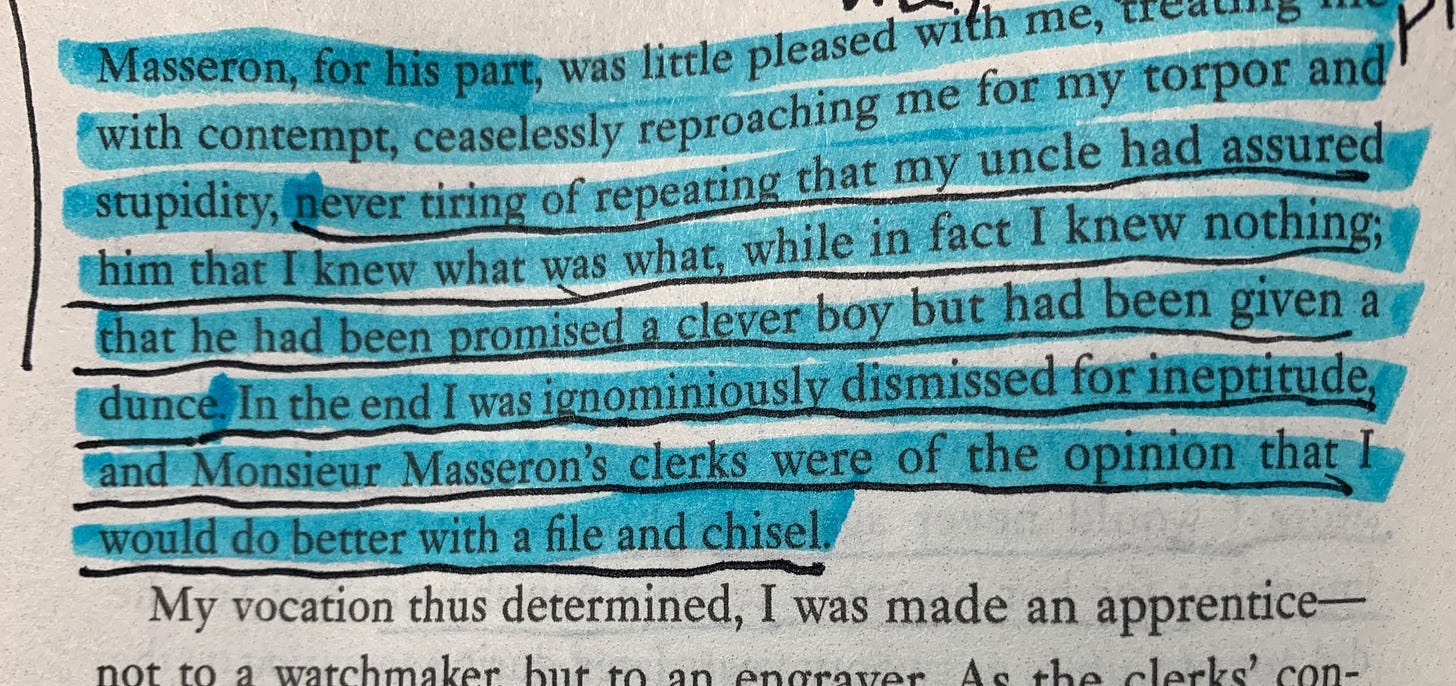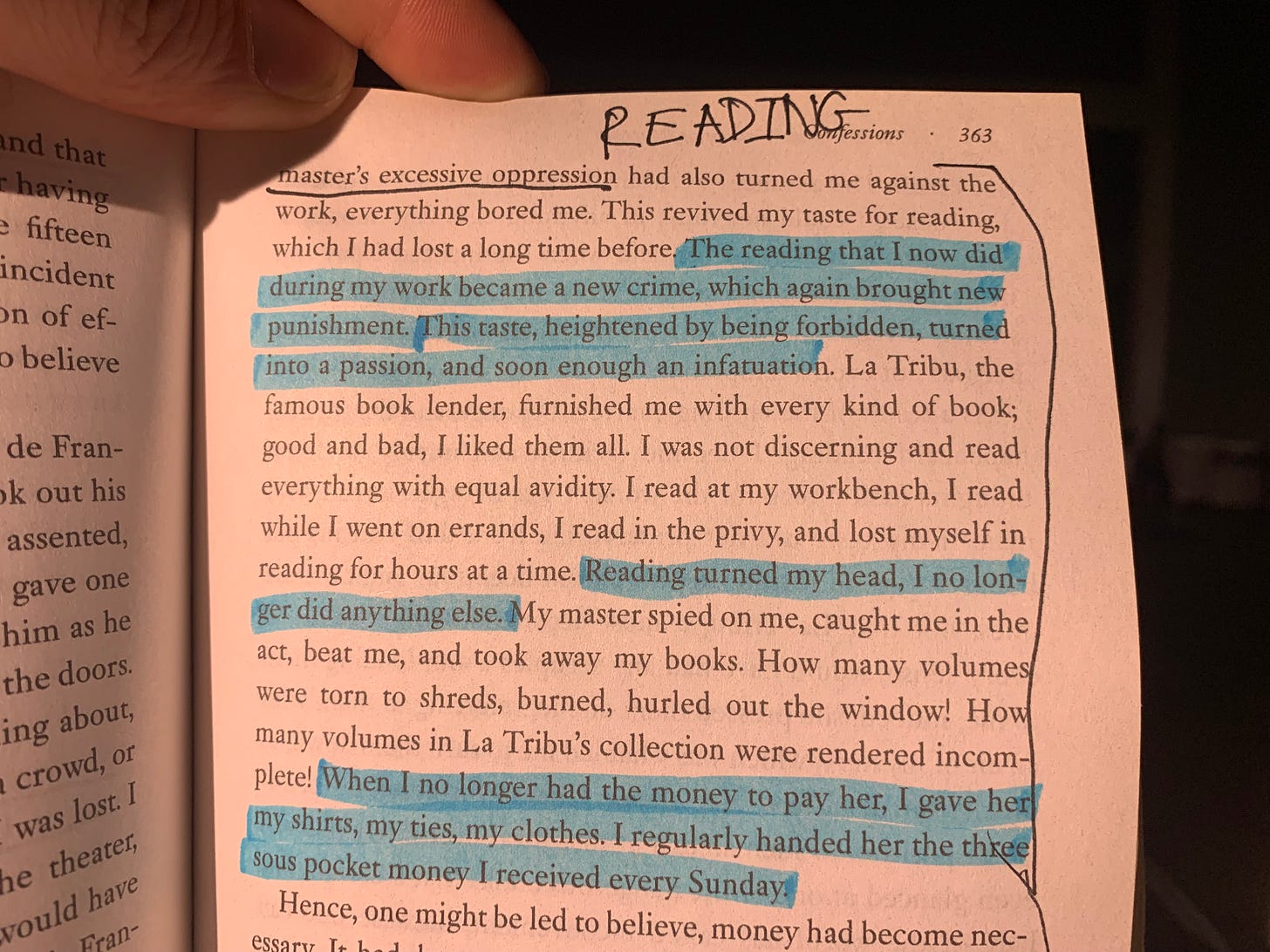*Want to read ALL of my content? Get a paid subscription for only $35/year (that’s less than $3/month)
When I found Rousseau’s (1712-1778, Geneva-born) autobiography, Confessions, in a random bookstore I now no longer remember where, I expected the usual polite, tepid 18th century orthodoxy. Instead what I found was shocking, both in content and in style, not to mention complexity, nuance, and depth.
For those of you unfamiliar with Jean-Jacques Rousseau—aka for all of you under 40 who no longer read books or know anything about history: Half kidding—here’s a basic, brief primer: He was a Genevan-born (Geneva was its own city-state at this time, not yet part of Switzerland) 18th century Enlightenment philosopher, thinker, author, and I’d venture to say democratic social activist. He lived in a time of kings and constitutional monarchies and was a firm believer in the republican form of government. His most famous works include Discourse on Inequality, The Social Contract, Julie, or the New Heloise, and Emile. He had a massive influence on the American and French revolutions and on both governments’ creation of democratic societies and political structures. He is, therefore, profoundly important.
I suppose I opened the book expecting political diatribes, treatises on kings and constitutions, and briefs about inequality between men from the perspective of nature and government. Instead what hit me—in fact punched me square in the face—was his raunchy, risky, honest, deep, vulnerable, incredibly authentic journey into the inner life of one of our most celebrated (and at the time both loved and loathed) thinkers.
First off, similarly to writers/leaders/thinkers like George Washington, Earnest Hemingway, Maya Angelou, George Orwell and Steve Jobs, Rousseau did not receive a traditional, conventional, formal education. He was the quintessential autodidact. More, he was essentially an orphan. His mother died shortly after his birth due to birthing complications, his father fled the country to avoid imprisonment based on a social concern with a man of higher social rank (which mattered a great deal in 18th century Europe), and his brother ran away, never to be found again (likely dying early on).
He was, therefore, handed over to aunts and uncles and was taught a trade but was ultimately treated horribly and, at 16, he fled. He became a teenage drifter-vagabond and walked everywhere on foot, sometimes sleeping in the bushes. Eventually he was taken in by the Catholic church (and essentially molested twice) by a woman he called “Maman” who basically became is replacement surrogate mother. They developed a semi-sexual pseudo-incestuous maternal/son dynamic and a very close relationship. He stayed with her for many years on and off but finally went his own way. He converted to Catholicism from his native Protestantism.
He had several good friends, usually wild men his age or older who encouraged his more risky, comic, lurid side. He developed a love and an addictive craving for books which never left him. He also was what we today might call a “sex addict.” From his teens, he obsessed about sex and women. When he saw a beautiful woman his heart thundered in his chest, he couldn’t stop looking at or thinking about her, and he fantasized constantly, often without the said woman knowing anything about his desire. There were close calls, hand-holding, cheek-kissing, near-misses. Rousseau knows how to use sexual tension expertly in his autobiography. (I say “autobiography” not “memoir” since autobiography covers a whole life whereas memoir only a slice of it, and Confessions covers his life from childhood to his older age in the 1770s not long before his death.)
Eventually he discovered he possessed a talent for music composition and he began learning and then later composing musical scores and teaching music to girls and women for a fee. He seemed to have found a calling. Yet everywhere he went, and he drifted around from country to country, town to town, it seemed his friends—many of whose loyalty he always suspected—often became angry, annoyed and mischievous when the down-on-his-luck, uneducated Rousseau seemed to be surpassing them, or surpassing the level many people probably thought he deserved given the orphan poverty he came from. Again, this was a time when rank and social class meant everything. Rousseau from our contemporary vantage point might be called a “poor white.”
Yet he persisted.
Keep reading with a 7-day free trial
Subscribe to Michael Mohr's Sincere American Writing to keep reading this post and get 7 days of free access to the full post archives.





